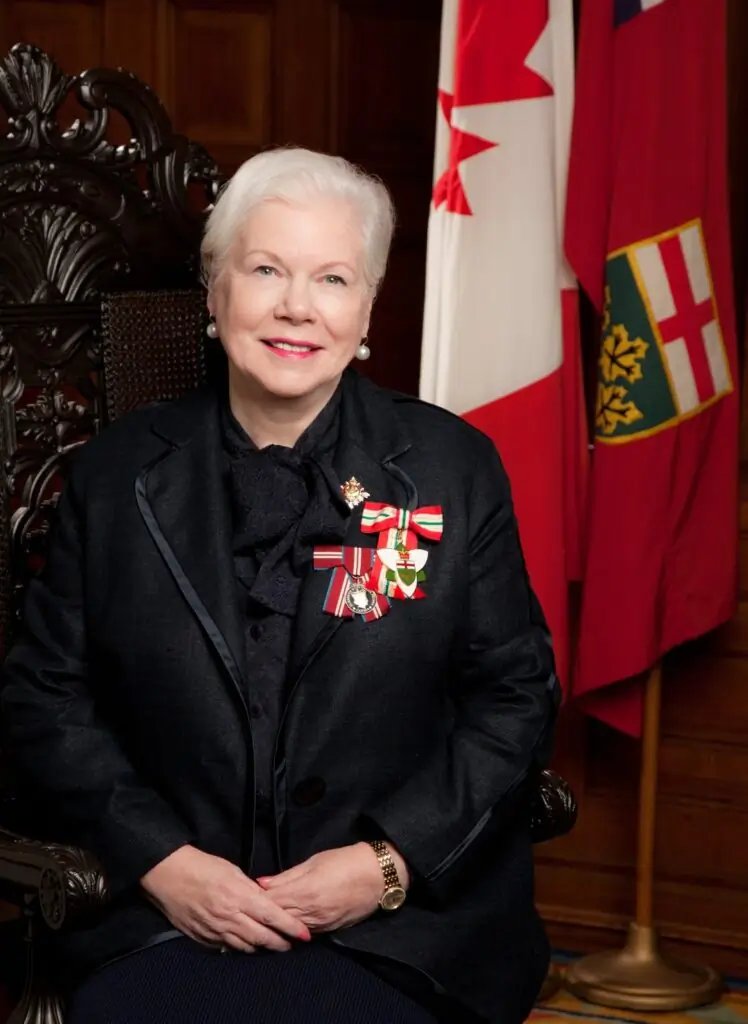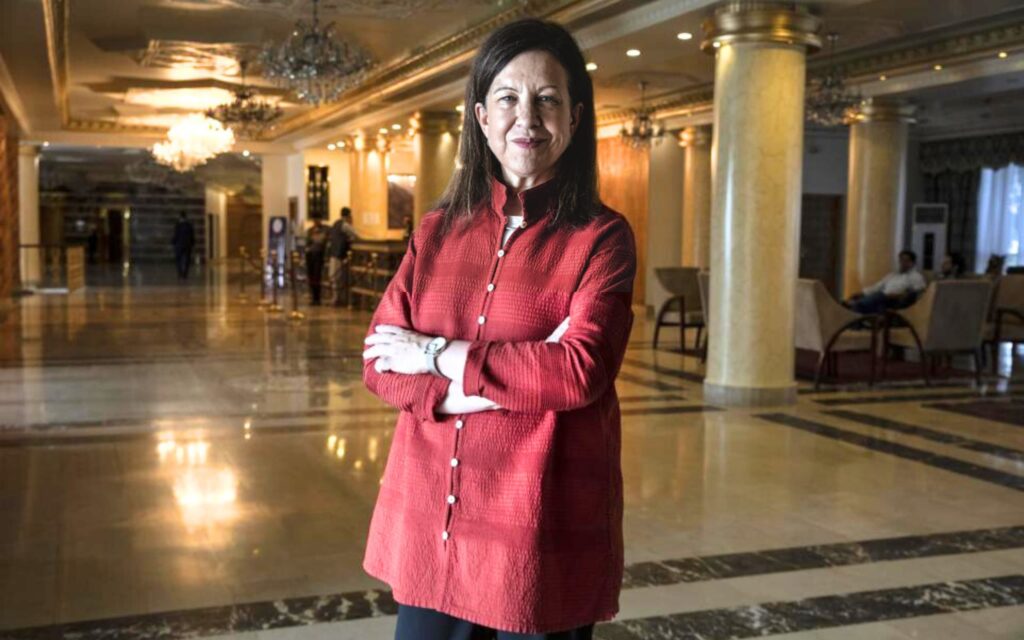
Elizabeth Dowdeswell on her childhood
Jennifer Stewart: You have had the most extraordinary career, but we’d like to start at the beginning. You were born in Ireland and raised in Saskatchewan. What was your childhood like?
Elizabeth Dowdeswell: When people ask me what has influenced me along the way, I always start with that journey, because being an immigrant is particularly important to people here in Ontario and it’s a very common thing.
I was an immigrant raised in Saskatchewan, where resilience is the name of the game in small-town communities. It’s where you learn about community-building and social consciousness.
But I point to my family because my mother, in particular, was convinced that higher education was not only desirable but absolutely essential. There was never any talk in our family about getting further education; that was a given. I am also the eldest of eight children and we moved around a lot.
My mother also always said, “You can do anything you want to do. You just have to work hard.”
Elizabeth Dowdeswell
Catherine Clark: What was it like being the eldest of eight? How did that prepare you for later in life, especially with that expectation that you would work hard?
Elizabeth Dowdeswell: In our family, the way we managed was that the oldest took care of the next couple in line, and then they took care of the next couple. We had a big chart on our broom closet that had all of the tasks for the week, and those changed week by week. It just simply rotated.
You could only manage a household, that was a very public household, with everybody doing their fair share. Something that I do know about myself is that I’m very curious. That certainly has been key to the eclectic career path that I had, but I also learned something about taking risks. Both have allowed me to do the range of things I have.
Taking risks and embracing opportunities
Jennifer Stewart: Did you have an appetite for risk, even as a child? And what did you want to be when you grew up with that sort of ambition and structure that you had in your life at that time?
Elizabeth Dowdeswell: We were taught to do the best we could do. We had a very open household; people were constantly coming and going. You met all kinds of interesting people. Our parents raised us to be respectful and to follow instructions. There were rules in our household and, as the eldest, I was expected to be a role model for the rest of the family.
I’m not sure where the preparation for risk came from, except there were risks every time we moved locations across southern Saskatchewan, for example. You had to meet new people all the time. You were thrown into new circumstances all the time and that has served me very well.
Catherine Clark: There was a profile about you in the Saskatoon StarPhoenix where your former 4-H supervisor remembered you as an outstanding member who won many sewing awards. Are you still sewing?
Elizabeth Dowdeswell: Indeed. All of us need creativity and we exercise it in very different ways. For me, it’s working with my hands, and I love textiles and design. That was part of my university training as well, and I’ve done it all my life. Even in this job, I try to carve out a couple of hours on a Saturday morning. I have this fabric collection from all over the world, and it’s not getting used up any time soon.
Jennifer Stewart: You became a teacher. At what point did your career path change, and why?
Elizabeth Dowdeswell: I became a teacher because at that time you were either a teacher or a nurse; very few other options were available. Although I had thought I would go into law, that was what I was preparing to do. It was my contact with 4-H leaders that changed my trajectory.
I discovered that most of the people at the University of Saskatchewan doing extension work in 4-H were home economists or agronomists. It was working at the extension division that took me to the field of home economics.
Even then, it was a very comprehensive science degree, but I took all of my electives in fine arts and music. There was always that curiosity about going beyond a particular discipline or a particular field. That resulted in me doing a Masters degree in Behavioural Sciences. It paved the way for a very eclectic career opportunity.
Elizabeth Dowdeswell’s career insights
Catherine Clark: You’ve held some very interesting roles, and in organizations not known for being lightning-quick in how they adapt to things. But you’re comfortable with risk and you’re very curious, so how did you drive change within those slightly immovable types of institutions?
Elizabeth Dowdeswell: I must preface anything about my career path by saying it continues to be a work in progress. None of the positions I have taken, not even the first one, were planned. Unlike those who have a nice career path, all laid out and the steps to get there, that was just the opposite for me.
An interesting opportunity would arise and I’d ask myself, “Is that something worth doing? Will I be working with interesting people? And is it something that I know nothing about?”
Elizabeth Dowdeswell
And if I could answer those three questions, I usually said yes. And that is how I got from one place to another.
In retrospect, I’ve learned that it is so important to know yourself.
Elizabeth Dowdeswell
I know, for example, that I’m not a maintenance person: I’m more creative, I like to design, I like to create an institution rather than simply going in and doing the daily work. I’m also not a specialist, much as I would love to be.
Someday, I love to know everything there is to know about a particular field. Of course, I’m not. I’m the world’s generalist: I know a little about many things, but not always in depth.
Much of what drives me is trying to break down silos.
Elizabeth Dowdeswell
I tend to think in patterns; I think systemically and holistically. It’s what has allowed me to move from discipline to discipline, from field to field, because I see the commonalities in the patterns rather than the substance. I know that I can always learn the substance — it’s the approach that makes the difference.
Elizabeth Dowdeswell about gender discrimination
Jennifer Stewart: You have been ahead of your time in terms of the women’s movement. Have you experienced gender discrimination in your career?
Elizabeth Dowdeswell: Absolutely. I’ve never spent much time focusing on it, and sometimes it’s more hidden than obvious. Most people are politically correct enough not to be outwardly annoying.
I remember meeting a group of diplomats from the Middle East when I was taking up the post with the United Nations. I’m one who immediately puts out my hand, and, of course, they refused to shake hands. It was a cultural thing and I understood that, but there were many times when I was the only female in the room. Less than less so these days, but that was certainly the case.
This year, the Meteorological Service of Canada is celebrating its 150th anniversary. At the time I was managing the Canadian weather service, I’m told I was the only woman and the only non-meteorologist managing a weather service in the world. I’ve never bothered to find out if that’s true, but my anecdotal evidence is that when I was at the World Meteorological Organization, there were never any women in the audience.
It wasn’t my job to predict the weather; it was my job to recognize the amazing talent in the organization and to ensure they had the tools to do their job and reach their full potential. That’s the position of so many managers, to create circumstances where people can be successful.
My job now is to listen to people and to find conversations that will resonate with the citizens of Ontario. It’s not so much focusing on the differences but on listening so that you can find common cause.
Elizabeth Dowdeswell about success
Catherine Clark: Can you help us understand how women should look at the idea of success? In terms of the challenges and opportunities you have faced, what, to you, really signifies success?
Elizabeth Dowdeswell: I am always reluctant to give advice, because I only know my own experience.
I am so lucky; I’ve had a world of possibilities that are just amazing to me. I learn every day, I love to go to work every day, and I can’t imagine not working. It’s such a privilege.
Elizabeth Dowdeswell
I know that’s not everyone’s circumstance, but that’s important to me. Finding work to do where you are challenged but also where you can live authentically — where what you’re doing and what matters to you and what kind of contribution you’re making, deep down makes you happy. I think you need to find ways to be comfortable in your own shoes.
Catherine Clark: What’s next for you?
Elizabeth Dowdeswell: I have no idea. The position of Lieutenant Governor doesn’t have a specific end date, but one of these days it will end. I will accept that, but it is the greatest privilege of my life to serve the people of Ontario in this way.
I’ve learned a lot from everyone and about the constitutional role, but for me it’s the community role that has been so important — the listening, the connecting, the convening — and a real opportunity to focus on important things like democracy and sustainability. Also, it’s a way to bring people together to learn about issues, you can think about things beyond the four-year tenure of a political cycle. It’s been the most amazing time, I have no regrets, and I have no idea what’s around the corner.







